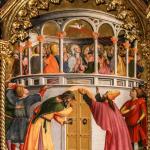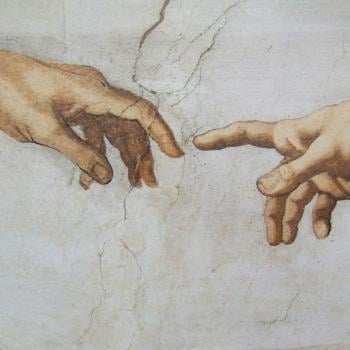
It’s easy to assume monasticism is all about works. Certainly, many monastic texts will emphasize the need to engage ascetic discipline, giving all kinds of warnings to those who do not faithfully live out their religious vocation, and in doing so, serve as evidence that this is what monasticism is about. But if this really what monasticism was about, it would not have thrived for centuries. Monasticism, likewise, would have been rejected by Christianity because its principles would run contrary to Christian teachings about grace. Monasticism would have proven to be a Pelagian mistake, and the enterprise would have come to an end (at least within mainstream Christianity). This is not to say that we can’t find connections between monasticism and Pelagian thought, for they do exist; Pelagianism borrowed from monastic thought, but it did so misunderstanding the greater monastic tradition.
Readers of various collections of sayings made from the lives and wisdom of the Desert Fathers will note that there is considerable amount of literature which could reinforce the Pelagian approach to monasticism, but they will also note, this is true only if such literature is done through proof-texting, that is, if other, relevant sayings are ignored. For, reading through the sayings collections, it is clear that the spiritual elders, those who were trusted by the community to represent the best of the community, fought against such a mistaken view of monasticism; they knew grace was central to the Christian life, and that had to be true, not only for the ordinary Christian, but for those with a monastic calling as well. We can find an example of this in the following saying; in it, an anonymous elder indicated that if someone truly embraced the charitable notions of the faith, even if they often were negligent in regards monastic discipline, they could and would be met with God’s charity and love at the end of their lives:
There was a brother living the monastic life quite negligently. When he was about to die, some of the fathers were sitting with him. Perceiving that he was departing from the body in joy and gladness and wanting to edify the brothers, the elder said to him, “Brother, believe me, we all know that you have not been very zealous in your ascetic practice; how then are you going forth so eagerly?” Said the brother, “Believe me, Father, what you said is true. Yet from when I became a monk, I do not know that I ever every passed judgment on anybody who slipped up or held a grudge against anybody, for I immediately reconciled myself with him the same day; and I want to say to God, ‘Lord-and-master, you said “Judge not that you be not judged,” and “Forgive, and it self be forgiven you.”’” Everybody was edified, and the elder said to him, “Peace be with you my son, for you have been saved without toil.”[1]
We do not know much about the negligent monk. We do know that his negligence related to his approach to the ascetic life. It seems that there was something which he did which made it appear he was not as devoted to the ascetic life as his fellow monks; they probably thought of him as being very lax. It is possible that, for him, what he was able to achieve was rigorous, that he had developed far beyond the state he was in when he first joined the monastic community, but in regards to appearances, and his role in the community, it looked like he was far off from what was expected of him. And yet, he had done something which many others had not been able to do. His heart was in the right. He had come to know and love God, and in that love, became confident with his relationship with God. He did not fear death because he knew God’s mercy and love, a mercy and love which he not only embraced, but shared with others in the way he treated them. He sought to reconcile himself with others, never letting hatred or pride take a hold of his heart. In this way, though he did not embrace as rigorous a discipline as many others in his community, his time in the community had worked to transform him and make him ready for death. What he was able to do, what he was able to achieve, was without toil, showing salvation was of grace, and that one can be transformed with grace without toil, contrary to the Pelagian understanding of salvation. While many of the other monks around him were surprised at this, the elder who had the monk speak already knew this; that elder wanted to make sure the dying monk’s words could and would be used to appropriately direct the community, making sure that they did not get the wrong idea of monasticism.
Pelagian thought does accept grace is helpful for those who have fallen astray, but it suggests it is possible not to need it. That is, Pelagians suggest it is possible to attain a natural perfection apart from grace. It is easy to see how those who would follow such an ideology would look for and expect perfection in others, and so judge and condemn others based upon their works. The assumption is that those who are perfect will manifest it in the works they do. And, to be sure, those who receive grace should find themselves transformed by it, but the transformation doesn’t mean everyone will do so all in the same way. The greatest transformation, and what is key to all others, is the transformation of the heart, allowing someone to build a character which reflects God’s love and grace; though others will find grace transforms them in order to do certain, specific works in their lives, they must understand such works are not going to be the same for everyone. Such works help develop the kind of righteousness they have, but they are not righteous merely because of the works they have done; their righteousness comes first and foremost to the grace which they have been given, and then the cooperation they have had with grace by fulfilling the calling it gave them in their lives. Thus righteousness is important, but the key to righteousness is found the words of Christ – we are to forgive, so that we can be forgiven. We are to be people of mercy so that we can receive mercy. That is the foundation of Christian righteousness. If we truly want to be holy, we will embrace God’s loving grace and apply it in the way we deal with those who come into our lives.
[1] John Wortley, trans., The Book of the Elders: Sayings of the Desert Fathers (Collegeville, MN: Cistercian Publications, 2012), 286 [N530].
Stay in touch! Like A Little Bit of Nothing on Facebook.
If you liked what you read, please consider sharing it with your friends and family!
N.B.: While I read comments to moderate them, I rarely respond to them. If I don’t respond to your comment directly, don’t assume I am unthankful for it. I appreciate it. But I want readers to feel free to ask questions, and hopefully, dialogue with each other. I have shared what I wanted to say, though some responses will get a brief reply by me, or, if I find it interesting and something I can engage fully, as the foundation for another post. I have had many posts inspired or improved upon thanks to my readers.













